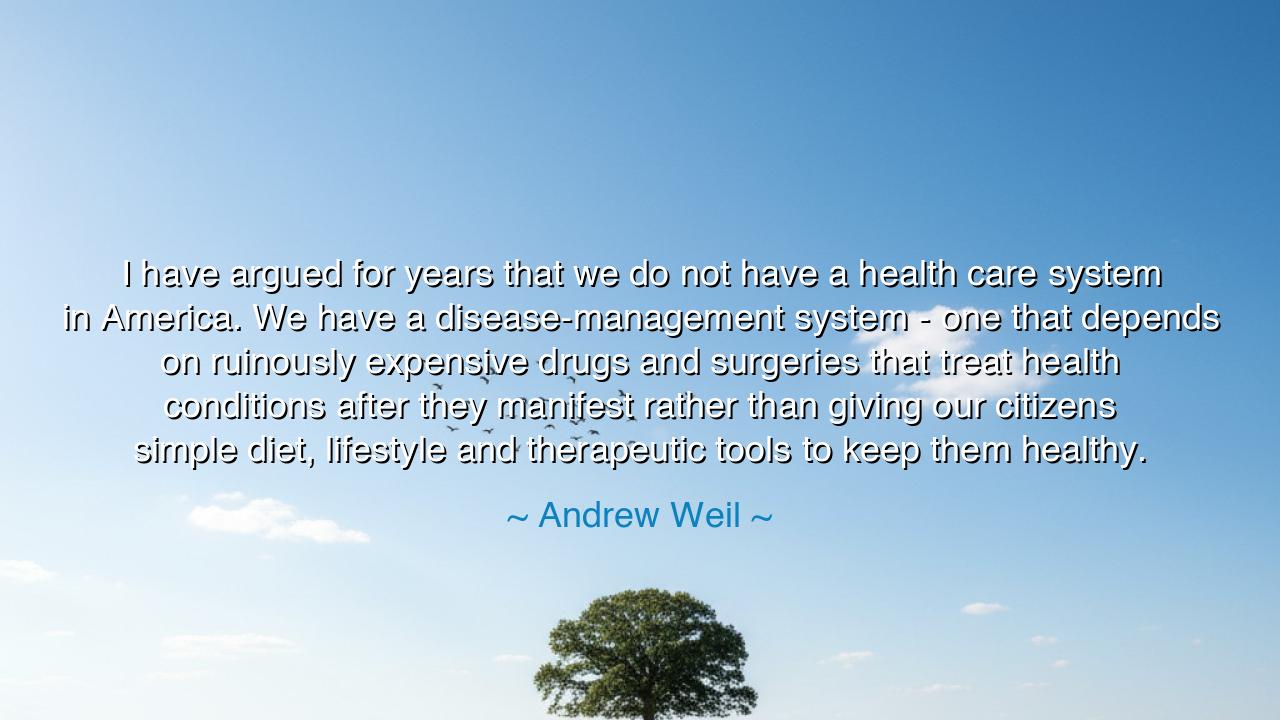
I have argued for years that we do not have a health care system
I have argued for years that we do not have a health care system in America. We have a disease-management system - one that depends on ruinously expensive drugs and surgeries that treat health conditions after they manifest rather than giving our citizens simple diet, lifestyle and therapeutic tools to keep them healthy.






In the words of Andrew Weil, there resounds a lament that is also a prophecy: “I have argued for years that we do not have a health care system in America. We have a disease-management system—one that depends on ruinously expensive drugs and surgeries that treat health conditions after they manifest rather than giving our citizens simple diet, lifestyle, and therapeutic tools to keep them healthy.” These are not the idle words of complaint, but the cry of one who has seen the great machine of modern medicine turn its face away from its sacred purpose. He speaks not only as a physician, but as a seeker of balance—a healer who remembers that true medicine begins not with cure, but with prevention, not with the scalpel, but with wisdom.
To understand Weil’s words, one must see the chasm that divides healing from treatment. Healing is the art of harmony, of nurturing the body so that disease finds no soil in which to grow. Treatment, however, is the battle waged after the war is already lost—a costly, painful, and often desperate attempt to undo years of neglect. In the ancient world, healers were not revered for their ability to cut or medicate, but for their power to preserve health through guidance, herbs, and mindful living. The body was seen as a temple, its balance a reflection of divine order. Modern medicine, in its speed and ambition, has forgotten this sacred principle. It has built its empire upon intervention, not prevention; upon crisis, not care.
The disease-management system, as Weil calls it, thrives on the aftermath of imbalance. It profits not from keeping people well, but from tending their chronic decay. Hospitals overflow with those whose suffering could have been prevented by a change in diet, a walk in the sun, a life less poisoned by stress. We are taught to trust the pill more than the plate, to silence the body’s whispers until they become screams. And yet, the ancients knew what we have forgotten: that food is medicine, that movement is therapy, and that balance—in mind, body, and spirit—is the foundation of all vitality.
Consider the example of the legendary physician Hippocrates, who lived in Greece more than two thousand years ago. He, too, watched as his peers turned toward complexity and spectacle. But he taught instead that health was maintained through simplicity—clean air, moderate exercise, wholesome food, and emotional tranquility. “Let food be thy medicine,” he declared, and in those few words he gave the blueprint for a civilization of wellness. It was not the knife but the kitchen, not the drug but the discipline, that he believed would preserve life. Andrew Weil, in his time, revives this wisdom of old—reminding us that humanity’s salvation will not be found in laboratories alone, but in our daily choices and the rhythms of living that align us once more with nature.
Yet Weil’s voice also carries a note of sorrow, for he speaks of a society that has lost its way. We have built temples of steel and glass where healers wear masks of profit, and patients become customers. The disease-management system is the shadow of our own neglect—a mirror reflecting how far we have drifted from self-responsibility. We seek salvation in miracles of science, yet scorn the miracles within our reach: a nourishing meal, a peaceful mind, a body in motion. We have mistaken comfort for care, and convenience for wisdom. Our ancestors knew that the price of health was attention, not indulgence. Today, we pay with suffering for what we refused to prevent.
But Weil’s message is not despair—it is awakening. He calls us back to the forgotten covenant between human and body. He teaches that the power to heal is not owned by institutions, but granted to every person who chooses to live consciously. To nourish one’s body through wholesome food, to tend one’s spirit through rest and gratitude, to move the body daily and breathe deeply—these are not small acts. They are revolutions. Every choice to live naturally weakens the grip of the disease-machine. Every home that grows herbs, every soul that seeks balance, becomes a fortress of true health in a world that profits from weakness.
Let us then draw the lesson from his words: Do not wait for illness to remember the value of health. Live preventively, not reactively. Return to the old wisdom that your ancestors knew—the wisdom that the earth provides what the body needs, that joy strengthens the heart more than any drug, and that caring for oneself is a duty as sacred as prayer. The true health care system is not a network of hospitals—it is the daily discipline of the people, the collective consciousness of those who choose vitality over indulgence, awareness over apathy.
And so, remember this, O listener: the future of health is not written in policy or technology—it is written in your habits, your thoughts, and your choices. The disease-management system may rule the world, but it cannot rule your life, unless you surrender it. Become again the healer of your own body. Walk, eat with reverence, breathe as though each breath were holy. For when we return to these ancient truths, we will no longer need to manage disease—we will, at last, learn to live in the radiant light of true health.






AAdministratorAdministrator
Welcome, honored guests. Please leave a comment, we will respond soon